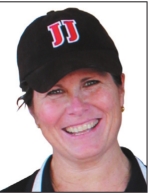EMPLOYMENT PERSPECTIVES

Jobs and the challenges in filling them
The new year has barely kicked off, and local job fairs are abounding, despite reports by Wallethub.com that Shreveport may be one of the worst places to find a job.
CSRA recently held a job fair seeking to fill 500 IT positions of the 800 jobs it promises to have filled by the end of 2018, while Harrah’s Louisiana Downs sought to round up a number of new employees to fill all types of slots.
But experts say that while local unemployment is at an all-time low (around 4.6 percent), those higher-end jobs are not the only ones out there, and some employers are almost desperate to fill all kinds of positions with quality workers and general laborers who are trainable and reliable.
Arlena Acree, director of economic development and film for the city of Shreveport, helps recruit new companies to the area, and those companies will be seeking employees.
“The key is trying to find the underemployed folks that aren’t making the kind of money that maybe they should be making,” Acree said. “That gives them another opportunity to better themselves.” Jim Shockley, president of the Manufacturing Managers Council, agrees that jobs are available.
“While I don’t personally know of any manufacturing companies coming in the immediate future, there are plenty of jobs out there right now,” said Shockley, whose regular position is with Gordon Inc. of Bossier City. “When oilfield work is down, I have plenty of people who come to me for jobs, and I have positions open. But when the oilfield is back up again, well, they leave again and go with the money.”
 “Jobs
can range from an operations manager to an administrative assistant.
However, the majority of the positions we staff for in our industrial
division are assembly line, mechanics and forklift operator positions
for manufacturing plants in Shreveport/Bossier.”
“Jobs
can range from an operations manager to an administrative assistant.
However, the majority of the positions we staff for in our industrial
division are assembly line, mechanics and forklift operator positions
for manufacturing plants in Shreveport/Bossier.”
April Acree Heaberlin, Career Adventures
At Career Adventures, April Acree Heaberlin said they aid two customer profiles, employers and employees.
“The demand for one or the other is constantly changing,” Heaberlin said. “Sometimes we are in need of more jobs to place our prospective employees, and sometimes we are need of more qualified employees that match our job openings. Our business is very sensitive to the local economic climate.”
Today’s market for jobs shows a large cross-section, requiring an agency to provide a diverse selection.
“They can range from an operations manager to an administrative assistant,” she said. “However, the majority of the positions we staff for in our industrial division are assembly line, mechanics and forklift operator positions for manufacturing plants in Shreveport/Bossier.”
Heaberlin says employers are seeking workers with a stable job history, dependability, ability to pass pre-employment screening and a skillset that matches the job’s requirements.
However, the employee is looking for a job that must meet transportation needs, scheduling issues, child-care conflicts and pay requirements.
The medical field is one of the fastestgrowing, and jobs are always available.
“We are constantly looking for additional employees as our business continues to grow,” said Michael Corbin, director of business relations for Always Best Care Senior Services.
And although ABC receives hundreds of applications, it is often difficult to fill needed positions.
“For our caregiver positions, the competitive market and nature of our business – providing care services on the patient's schedule – can limit the pool of qualified applicants,” he pointed out.
 “First
impressions are important. Did the applicant show up on time for their
interview, were they dressed appropriately, did they keep their cell
phone in their purse or pocket?" Micheal Corbin, ABC Senior Services
“First
impressions are important. Did the applicant show up on time for their
interview, were they dressed appropriately, did they keep their cell
phone in their purse or pocket?" Micheal Corbin, ABC Senior Services
When trying to hire employees, Corbin has a couple of things to overcome.
“First,
competition from hospitals, nursing homes and other medical-related
employers. Second, is finding employees in this field who desire to work
40 hours a week,” he said.
Objections from prospective employees include applicants who don’t want to work more than 20 hours a week, transportation issues getting to and from work and inability to work weekends and nights.
ABC is looking for certain traits in an employee.
“First impressions are important,” Corbin said. “Did the applicant show up on time for their interview, were they dressed appropriately, did they keep their cell phone in their purse or pocket? Additionally, we look for a compassionate person who understands how to be a caregiver and has the ability to adapt to the patient's circumstances as needed.”
“When oilfield work is down, I have plenty of people who come to me for jobs, and I have positions open. But when the oilfield is back up again, well, they leave again and go with the money.”
Jim Shockley, president of the Manufacturing Managers Council
As with most employers, skill is preferred, but ABC will provide training.
They seek high school graduates who have earned a Certified Nursing Assistant (CNA) or MA (Medical Assistant) certificate. Experience in the field can offset the need for a CNA or MA, but the pay rate is often less.
Reliability, or the lack thereof, can sometimes be traced to the employee’s former work history.
ABC performs background checks and drug screens.
“A large percentage of our applicants pass both due to this being one of the last steps in the on-boarding process,” Corbin said. “We ask multiple times if there will be a problem with either the background check or drug screen during the interview process giving the applicant an opportunity to reveal issues.”
ABC utilizes social media, local print (Forum and LOLA) and local job fairs. A large number of applicants walk in the door asking about employment opportunities.
Incentive programs are available to employees who have a good work record.
Rebecca
Bonnevier, SMG general manager with CenturyLink Center, says their
corporation, which turned 40 in 2017, is often looking for part-time
staff, and only occasionally will full-time positions open.
“Some full-time positions have taken time to fill because we want to be sure we find the right person,” Bonnevier said. “Our industry requires long hours and work to be done on weekends and holidays, so it takes time to find skilled people willing to do this. Part-time positions are easier to fill and are often people who are either retired, or already work fulltime elsewhere, but need extra income.
The times we need them are usually when they are available to work.”
In addition to finding people willing to work the unusual hours, Bonnevier said it is also hard to find employees who can pass background and credit checks. But there is another, perhaps more frustrating reason employees in her business “don’t work out.”
“People want to work here to see free shows. Our jobs are to ensure operations run smoothly so our guests can enjoy the shows,” she said. “Our team is usually so busy working the events, we don’t see much, if any, of the event.”
So, when vetting prospective employees, she looks for those who are energetic, honest, friendly and willing to help. Experience is not necessary for a part-time position.
“We train our part-time staff,” Bonnevier said. “Full-time staff requires experience, skill and/or education in a specialized field.
“We will not hire someone with a felony,” she added. “Background checks are required. If staff deals with money, they must also pass certain credit checks, and not passing credit checks is the most often reason people cannot be hired.”
 “We
train our part-time staff. Full-time staff requires experience, skill
and/or education in a specialized field. We will not hire someone with a
felony. Background checks are required. If staff deals with money, they
must also pass certain credit checks, and not passing credit checks is
the most often reason people cannot be hired.”
“We
train our part-time staff. Full-time staff requires experience, skill
and/or education in a specialized field. We will not hire someone with a
felony. Background checks are required. If staff deals with money, they
must also pass certain credit checks, and not passing credit checks is
the most often reason people cannot be hired.”
Rebecca Bonnevier, SMG general manager with CenturyLink
Like every company, SMG has some turnover through attrition.
“But SMG also has many employees that have been with the company longterm,” Bonnevier said. “I have been with SMG nearly 20 years, as has also our director of food and beverage and director of operations. We also have part-time staff that has been working here since the building opened. That longevity says a lot.”
Allison and Patrick Walsh own two local businesses – Jimmy John’s and Window King. They have around 25 to 30 mostly part-time employees at two locations of Jimmy John’s Gourmet Sandwiches, a franchise business they have owned for almost five years.
Allison Walsh said she grew up with a pretty strict work ethic and wants her employees to have that while enjoying their job at the same time.
At Jimmy John’s, the Walshes are looking for a can-do attitude, a friendly smile, a person who is not afraid to look others in the eye.
“Someone who wants to have fun, but is not afraid to work hard,” she said.
And they don’t have to go far to find prospective employees.

“We like to promote within, so we hire some people with management experience, but almost everyone started at hourly wage and worked their way up. But we have some people that have potential, and they come to us and ask us to cut their hours. We had to ask what was going on, and they said they were losing their benefits because they were working too much.”
Allison Walsh, Jimmy John's
“We have a banner in front of our store and have an amazing amount of people who apply online, but not too many of those transfer into real-life employees,” she said. “For us, we love walk-ins. If we’re free, we can sit down and interview right then.”
They will get 20 to 30 applicants a day from Indeed or other online job searches, “but they don’t always come to fruition.”
Jimmy John’s is known for speed with a certain sense of urgency, so the Walshes provide training for their employees.
“Jimmy John’s is a very easy company to work for,” Walsh said. “We have maybe 28 sandwiches on the menu, and we want our employees to know them by number and description, and we train them the very first day.”
All prospective management must undergo a background check and, since Jimmy John’s employs drivers, they must have a valid license and insurance.
Employees who work too many hours to maintain governmental benefits are perhaps Walsh’s biggest challenge, she said.
“By doing that, they’re losing their benefits,” she said. “We like to promote within, so we hire some people with management experience, but almost everyone started at hourly wage and worked their way up. But we have some people that have potential, and they come to us and ask us to cut their hours. We had to ask what was going on, and they said they were losing their benefits because they were working too much.”
Unfortunately, Jimmy John’s is unable to offer benefits of its own to hourly employees.
“The Affordable Healthcare Act Employer Mandate is still out there and that would put us over the threshold, and we make maybe 10 percent after all the bills are paid, so we are being hurt by that,” she said. “But this is our home, and we are going to support our community – we are going to support our schools, our military, our police and all, even if it means taking up that 10 percent.”
The Walshes have given a new meaning to the term “mom and pop” business by taking their employees under their wings and treating them as family.
“We tell our employees, work for us as long as you want, do your job. If you don’t show up, then OK, you just go find another job,” Allison Walsh said. “But if you quit with notice, give us a headsup and do it like you're supposed to do it, we can be an advocate for you in the future.”
In fact, the Walshes have “kids” graduating high school, who have been working for them since their junior year.
“We are writing recommendations for them for colleges and other jobs, and it’s a wonderful thing – a fun thing,” she said. “We love these kids. We want them to be successful.”

